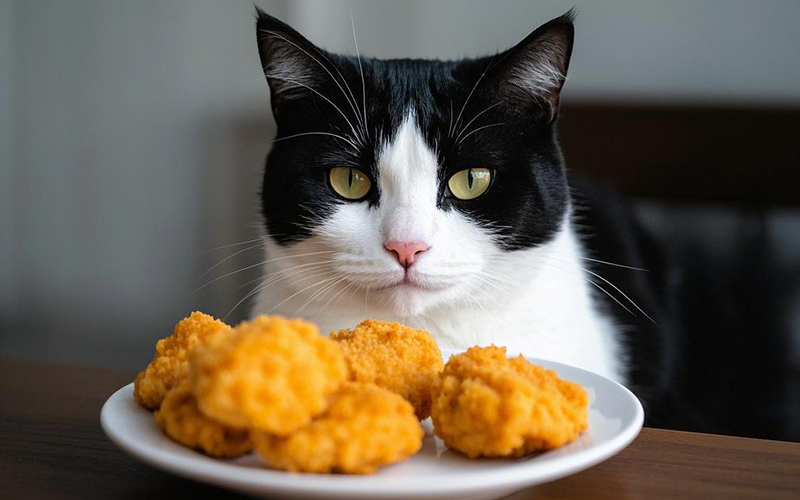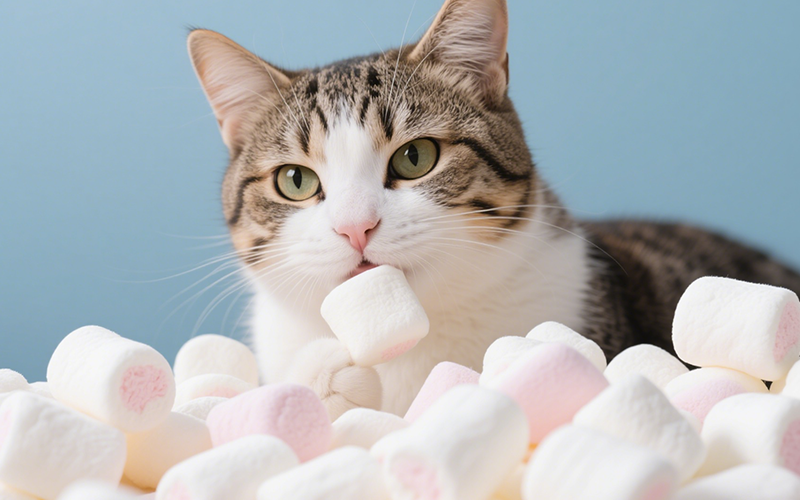Can Cats Eat Chicken Nuggets? A Guide to Safe and Healthy Treats for Your Feline Friend
- 12 Mar 2025 13:46
As a cat owner, it’s common to want to share your favorite foods with your furry companion. One food that might cross your mind is chicken nuggets. They’re tasty, convenient, and many humans love them! But can cats eat chicken nuggets? While chicken is generally safe for cats, chicken nuggets are a different story. Let’s explore why chicken nuggets might not be the best choice for your feline and what safer alternatives you can offer instead.

Why Chicken Nuggets Are Not Ideal for Cats 🚫
Although chicken itself can be a healthy treat for cats, chicken nuggets are not a good option for your cat due to several factors. Here’s why:
1. High in Salt 🧂
Chicken nuggets are typically processed and often contain a lot of added salt. Excessive sodium intake is harmful to cats and can lead to dehydration, kidney problems, and even salt poisoning in severe cases. Cats are not accustomed to processing large amounts of salt, so it’s best to avoid offering them salty foods like chicken nuggets.
2. Fried and High in Fat 🍟
Chicken nuggets are usually fried, which makes them high in unhealthy fats. A high-fat diet can lead to obesity, digestive issues, and even conditions like pancreatitis in cats. Fried foods also don’t provide the balanced nutrition cats need to stay healthy, as they primarily contain unhealthy fats and carbohydrates instead of animal-based protein.
3. Breading and Fillers 🍞
The breading and fillers used to make chicken nuggets are not suitable for cats. These ingredients often include flour, breadcrumbs, and spices that aren’t beneficial to your cat’s digestive system. Cats are obligate carnivores and are best suited to digesting animal protein, not processed carbohydrates and grains found in breaded foods.
4. Seasonings and Additives ⚠️
Chicken nuggets often contain seasonings, flavorings, and preservatives that are not safe for cats. Some seasonings, like onion powder or garlic powder, can be toxic to cats, leading to potential health risks such as anemia or organ damage. Even the artificial flavorings or preservatives in some processed foods can cause digestive upset or allergic reactions in cats.
5. Choking Hazard 🔴
Depending on the size of the chicken nugget and how it’s served, it could pose a choking hazard for your cat, especially if they are small or tend to eat quickly. If the nuggets are too large or not cut into manageable pieces, they may be difficult for your cat to chew and swallow safely.
The Risks of Feeding Cats Chicken Nuggets 🚨
Feeding your cat chicken nuggets could lead to several potential health issues:
Obesity: Due to the high fat and calorie content of chicken nuggets, frequent consumption could lead to weight gain and obesity, which can lead to diabetes and other health complications.
Digestive Problems: Cats may suffer from vomiting, diarrhea, or stomach discomfort after eating processed, greasy foods like chicken nuggets.
Kidney Damage: The high salt content could stress your cat’s kidneys, especially if they already have underlying kidney issues.
Toxicity: Certain seasonings used in chicken nuggets, like garlic or onion powder, are toxic to cats and can cause serious health problems, including liver damage or red blood cell destruction.
How to Safely Serve Chicken to Your Cat 🍗
If you want to treat your cat with chicken, it's best to serve it plain and cooked properly. Here’s how you can safely prepare chicken for your feline friend:
1. Cooked and Unseasoned Chicken 🍳
The best way to serve chicken to your cat is by cooking it (boiling or baking works best) without any added salt, spices, or seasoning. Avoid oils, butter, or other ingredients that could be harmful to your cat.
2. Cut into Small, Bite-Sized Pieces 🍴
Make sure to cut the chicken into small, manageable pieces that your cat can chew and swallow without any risk of choking. Removing bones is also crucial, as chicken bones can splinter and cause harm to your cat's digestive tract.
3. No Skin or Fat 🍖
Chicken skin and fat should be removed before serving to your cat. These parts are high in fat, which can lead to digestive issues or pancreatitis in cats. Stick to lean, boneless, skinless chicken for the healthiest option.
Safe Alternatives to Chicken Nuggets for Cats 🐱
If you’re looking for safe and healthy alternatives to share with your cat, here are some options:
1. Cooked Chicken or Turkey 🍗
Plain, cooked chicken or turkey (without bones or seasoning) is a great source of lean protein for cats. It’s easy to digest and provides essential nutrients for their overall health.
2. Canned Tuna or Salmon (in water, not oil) 🐟
Fish like tuna or salmon can be a tasty and healthy treat for your cat. Just make sure it’s packed in water and not oil, as oil can upset their stomach and lead to digestive issues. Serve in small portions as an occasional treat.
3. Cat-Specific Treats 🍖
There are many commercially available treats formulated specifically for cats, made with ingredients that support their nutritional needs. Look for treats that are high in protein and low in fat, and ensure they are free from artificial additives.
4. Small Pieces of Cooked Egg 🍳
Eggs are a great source of protein for cats. Scrambled or boiled eggs (without any seasoning) are an excellent alternative to processed treats. Just be sure to serve them in small portions to avoid any digestive upset.
5. Frozen Catnip or Cat Grass 🌿
For a natural treat, you can give your cat fresh catnip or cat grass, both of which are safe and enjoyable for most cats. These options also promote healthy digestion and provide a fun, interactive experience for your cat.
How to Safely Treat Your Cat 🐾
When giving treats to your cat, always remember these tips:
Moderation is Key: Treats should make up no more than 10% of your cat’s daily food intake. Overfeeding treats, especially those high in fat or salt, can lead to obesity or other health issues.
Monitor for Reactions: When introducing new treats, watch for any signs of discomfort, like vomiting or diarrhea. If you notice any problems, stop feeding the treat and consult your vet.
Offer Balanced Nutrition: Make sure your cat’s primary diet consists of high-quality cat food that meets all of their nutritional needs.
PettureX: Your Pet Health Assistant 🐾
If you’re ever unsure about what foods are safe for your cat, or if you need advice on your cat’s diet, PettureX is here to help. PettureX is an AI-powered pet health assistant available 24/7, offering reliable advice and tips to keep your cat happy and healthy.
Conclusion
Can cats eat chicken nuggets? While chicken itself is a healthy treat for cats, chicken nuggets are not a good choice due to the added salt, unhealthy fats, seasonings, and fillers. Instead, opt for plain, cooked chicken or other safe, nutritious alternatives to treat your cat in a way that supports their health.
If you have any doubts about your cat’s diet or want more information on safe treats, feel free to consult PettureX for helpful guidance on keeping your feline friend in tip-top shape. 🐱💙
Related

Persimmons and Paws: Can Cats Safely Eat This Autumn Fruit? A Vet-Reviewed Guide
- 23 Apr 2025
Nutritional Yeast for Cats: Savory Sprinkle or Health Hazard? A Vet-Reviewed Guide
- 23 Apr 2025
Marshmallows and Cats: A Puffy Problem? Why Vets Say No to This Sugary Snack
- 22 Apr 2025
Kefir for Kitties? A Veterinarian-Reviewed Guide to Safety, Benefits & Risks
- 22 Apr 2025
The Burning Question: Can Cats Eat Jalapenos? A Comprehensive Safety Guide
- 21 Apr 2025
Cool Temptation: Can Cats Eat Ice Cream Safely? The Vet-Backed Truth
- 21 Apr 2025
Frankly Dangerous: Can Cats Eat Hot Dogs? Vet Explains the Serious Risks
- 16 Apr 2025
A Purrfect Protein? Can Cats Eat Ground Turkey Safely? (Vet-Reviewed Guide)
- 16 Apr 2025
Gritty Situation: Can Cats Eat Grits Safely? Vet Explains the Risks
- 16 Apr 2025
Crunchy Query: Can Cats Eat Green Peppers? A Vet-Reviewed Safety Analysis
- 16 Apr 2025
